Key takeaways:
- Effective mentoring focuses on building genuine relationships through active listening, trust, and open communication.
- Mentors should share their experiences and vulnerabilities to create a more profound connection and support mentees in overcoming challenges.
- Success in mentoring is often measured by mentee growth, the depth of conversations, and the reciprocal feedback exchanged throughout the mentoring process.
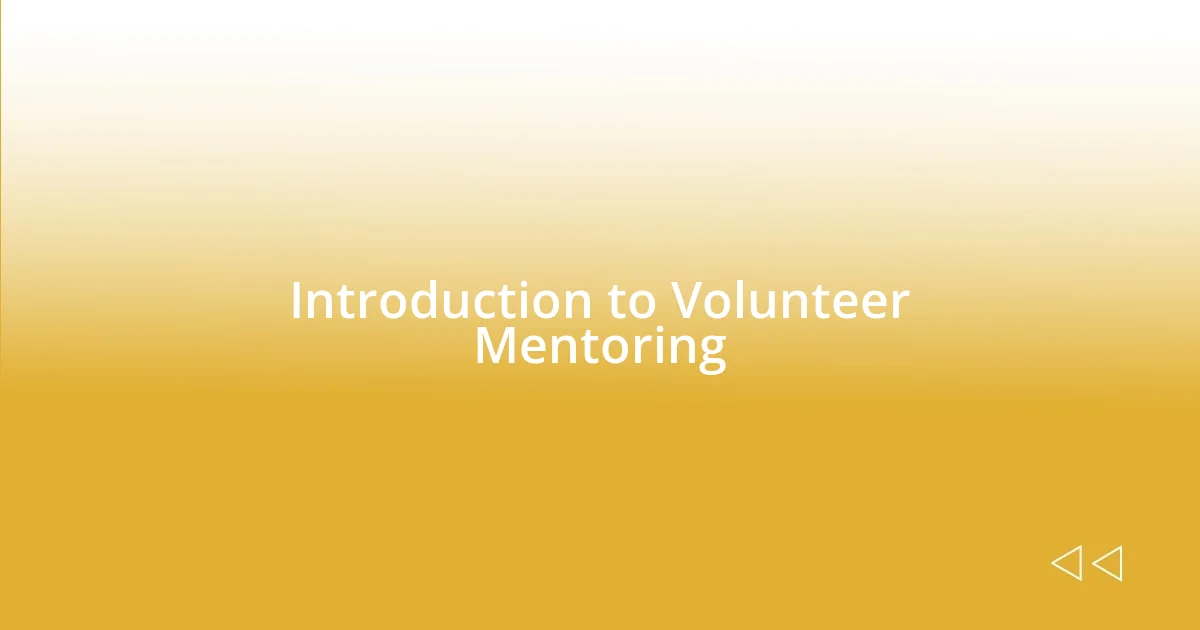
Introduction to Volunteer Mentoring
When I first considered becoming a volunteer mentor, I was filled with a mix of excitement and uncertainty. I wondered, “Could I truly make a difference in someone’s life?” This path opened up a treasure trove of experiences, allowing me to share knowledge while learning from the unique perspectives of those I mentored.
Volunteer mentoring, at its core, is about building relationships. I recall a mentee who struggled with confidence; just seeing her flourish each time we met was tremendously rewarding. It made me realize that mentoring isn’t just about teaching—it’s about empowering others to find their own strength.
The emotional connection that develops between a mentor and mentee is profound. I often found myself reflecting on my own journey, relating my challenges to those of my mentees, fostering a bond that deepened our conversations. Have you ever experienced a moment that made you see the world through someone else’s eyes? That’s the essence of volunteer mentoring—it’s a beautiful exchange of growth and realization.
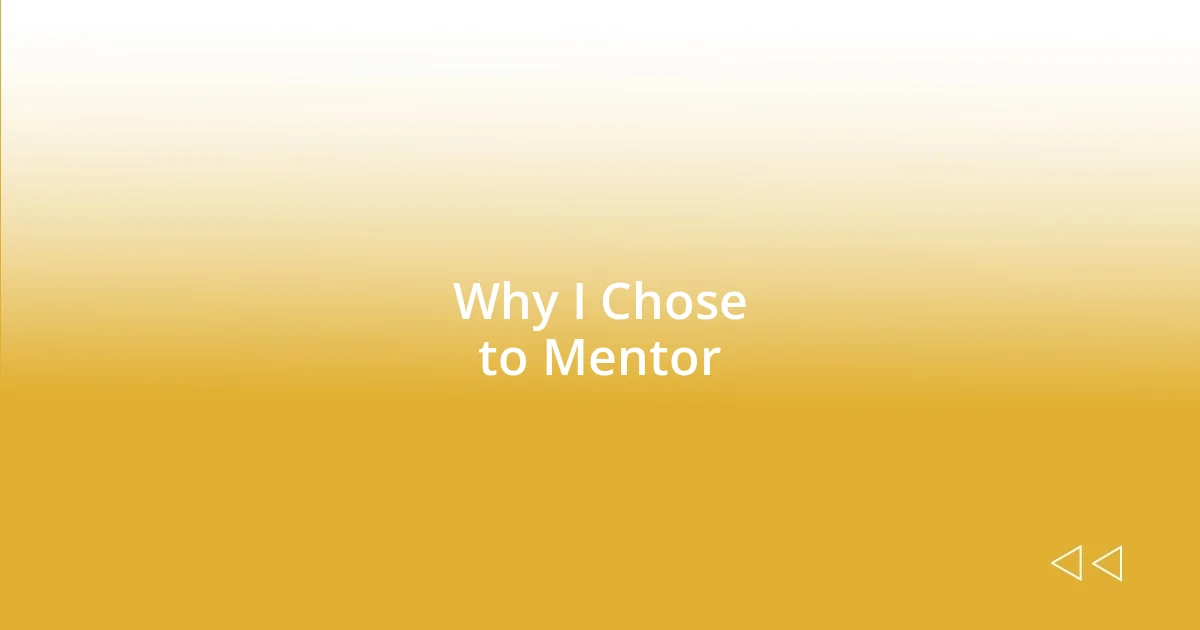
Why I Chose to Mentor
I chose to mentor because I believe in the power of connection. Reflecting on my own experiences, I remember a time when I felt lost and alone, struggling to navigate my goals. A mentor had stepped in during that pivotal moment, guiding me with encouragement and advice. The impact of that support stayed with me, igniting my desire to provide the same for others.
- I wanted to create a positive ripple effect in someone else’s life.
- Mentoring allows me to share valuable lessons learned from my mistakes.
- There’s something fulfilling about witnessing someone else’s growth.
- It helps me sharpen my own skills by teaching and articulating my thoughts.
- I find joy in the shared laughter and discussions that come with mentoring.
Ultimately, it’s about paying it forward. Volunteering as a mentor has become a way for me to not only nurture others but also keep my own journey vibrant and inspiring. Each conversation is a reminder that we’re all on a continuous path of learning and growth.
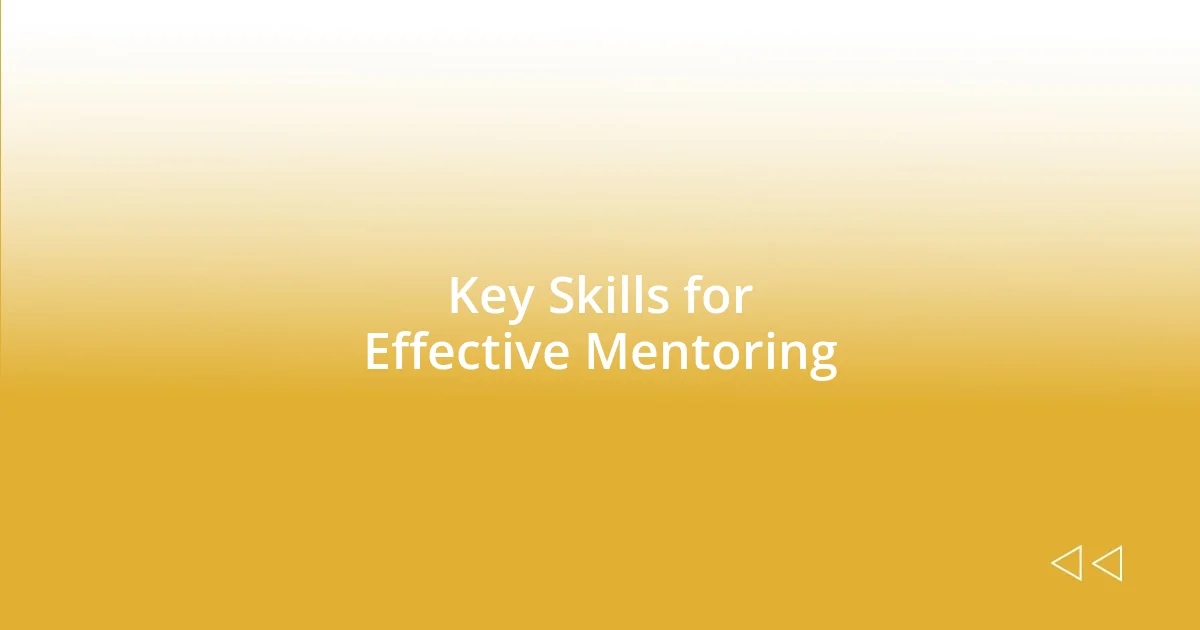
Key Skills for Effective Mentoring
Effective mentoring hinges on a few key skills that I have found essential throughout my journey. Active listening stands out as the most critical skill; it involves not only hearing the words my mentees share but also understanding their emotions and motivations. I remember a session where my mentee simply needed someone to validate her feelings about her career choices. By attentively listening, I provided the support she was seeking, which in turn, allowed her to open up and explore her fears without judgment.
Another crucial skill is the ability to ask probing questions. I’ve learned that the right questions can guide a mentee towards their own insights rather than simply giving them answers. For instance, during one of our discussions, I asked my mentee what she valued most in her career. This led to a profound realization about her passion for community service, shaping her career choices in a way that aligned with her values. It’s enlightening to see them find clarity just by articulating their thoughts.
Lastly, fostering trust is vital to the mentoring relationship. In my experience, trust creates a safe space where mentees feel comfortable sharing their vulnerabilities and aspirations. Once, after a few sessions, my mentee confessed she didn’t believe in her abilities. By sharing my own doubts from years ago, we built an unbreakable bond that encouraged her to take risks. That moment of vulnerability transformed our relationship, revealing the incredible power of authenticity in mentoring.
| Skill | Description |
|---|---|
| Active Listening | Understanding both words and emotions shared by the mentee. |
| Probing Questions | Asking questions that lead mentees to discover their own insights. |
| Fostering Trust | Creating a safe environment for open sharing and vulnerability. |
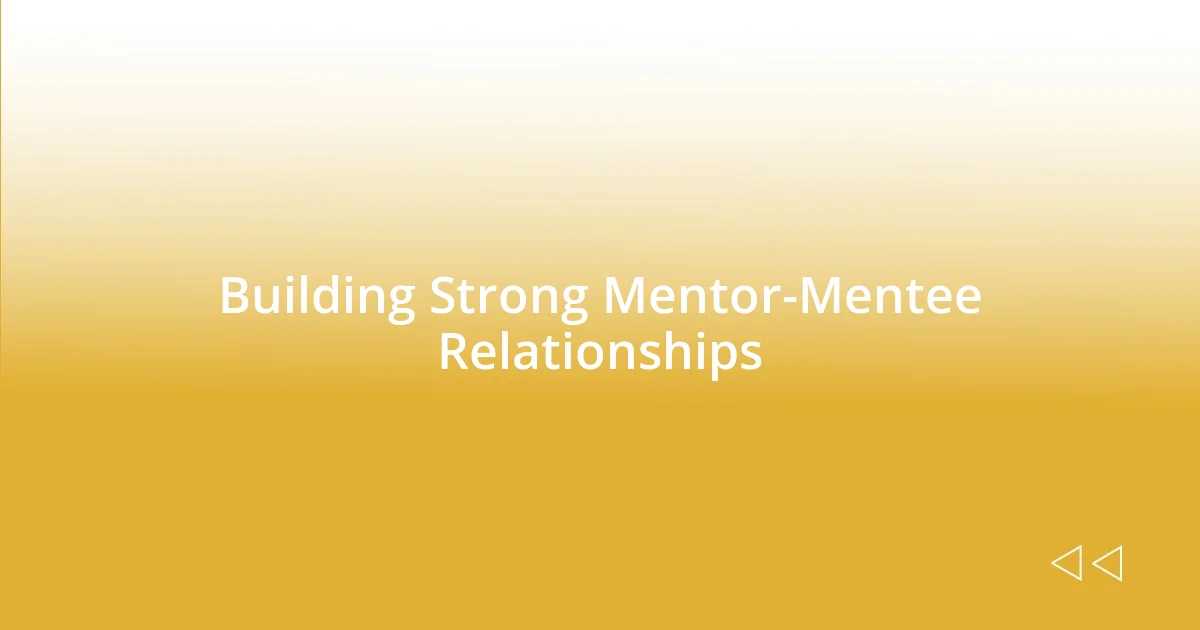
Building Strong Mentor-Mentee Relationships
Building a strong mentor-mentee relationship is all about creating a connection that feels genuine and supportive. I’ve often found that openness is key; when both sides are willing to share their thoughts and feelings, it fosters an environment of trust. I recall a moment when I shared a personal challenge with my mentee—her eyes lit up as she realized we all face struggles. That shared vulnerability not only brought us closer but also empowered her to confide in me about her own fears.
Another important aspect is recognizing the unique strengths and weaknesses of each individual. I’ve made it a point to ask my mentee what she feels most proud of. This simple question opened a floodgate of self-awareness for her, and she started to embrace her skills instead of doubting them. The more we acknowledged her achievements, the stronger our bond became. Isn’t it incredible how highlighting someone’s strengths can change their perspective entirely?
Consistent communication is an element that can’t be overlooked. Regular check-ins, even if they’re just brief messages, can reinforce that you’re invested in their journey. I remember one week when my mentee was feeling particularly overwhelmed. A simple text from me asking how she was doing provided her with a much-needed boost. It made me realize that mentorship isn’t just about the scheduled sessions; it’s about being present and engaged in the everyday moments, too. How do you think those little gestures may impact a mentee’s confidence and drive? I believe they have the power to ignite a spark of motivation that can lead to lasting change.
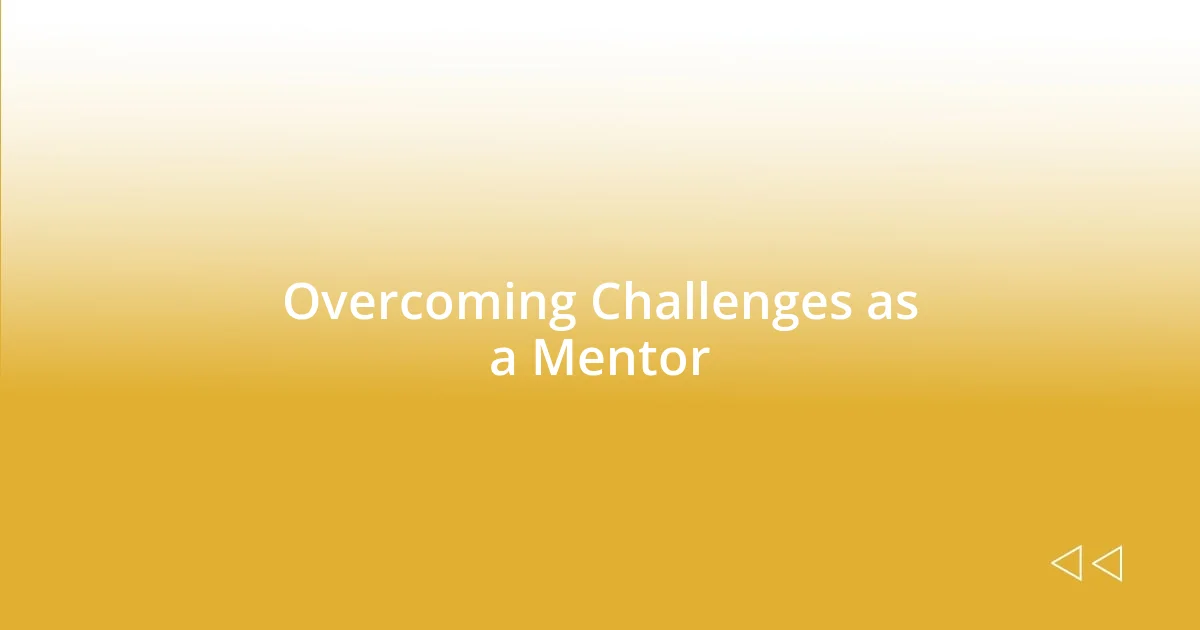
Overcoming Challenges as a Mentor
Navigating the challenges of mentoring isn’t always smooth sailing. I’ve faced moments where my mentees felt lost or overwhelmed, and it was my job to help them find their way. One particular session comes to mind when a mentee was grappling with self-doubt and fear of failure. In that instance, rather than offering quick solutions, I shared my own experiences with setbacks and how they shaped my path. It struck me then how shared vulnerability can pave the way for deeper connections.
Another hurdle often arises from differing communication styles between mentor and mentee. I’ve encountered mentees who may not express themselves openly or struggle to articulate their thoughts. During one of our sessions, I encouraged my mentee to express her worries about not meeting expectations. As she spoke, I realized the barrier was her fear of judgment. By providing a supportive space, I illustrated that it’s perfectly human to have doubts, easing her anxiety and fostering a more open dialogue. How have you approached situations where communication feels stifled?
Lastly, there are moments when managing expectations can be a challenge. I’ve learned that it’s essential to set realistic goals with my mentees from the beginning. In one instance, a mentee was eager to achieve significant milestones quickly. I had to guide her toward understanding that growth takes time and that embracing the journey mattered just as much as reaching the destination. The discussions we had then ignited a more resilient attitude in her. Isn’t it fascinating how sometimes simply reframing expectations can lead to newfound motivation?
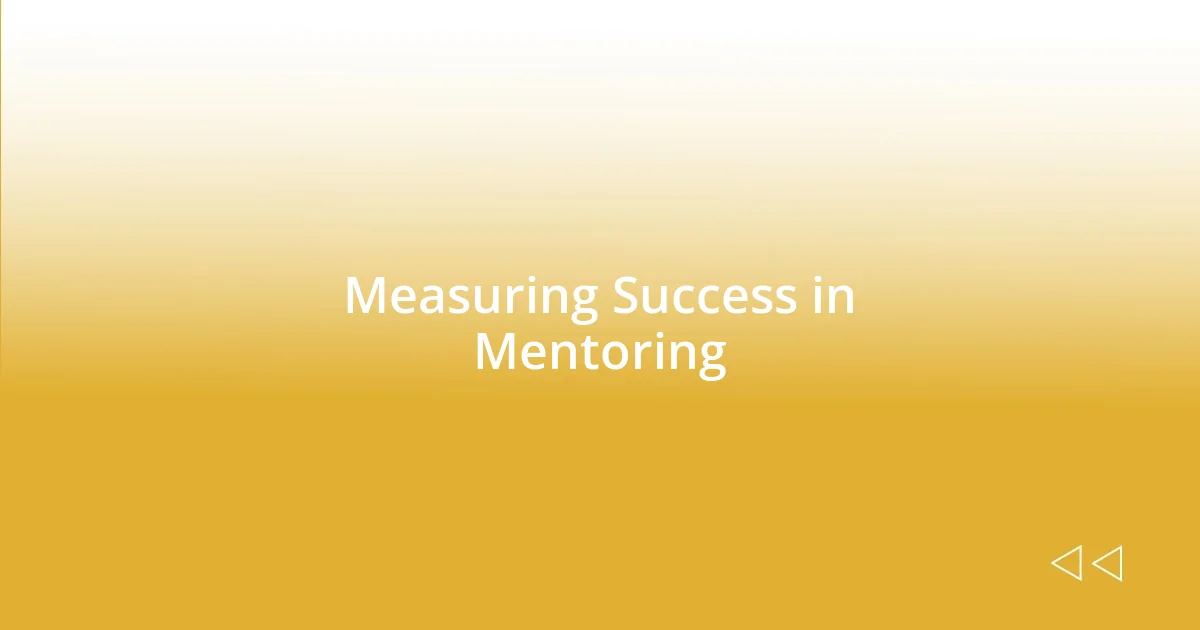
Measuring Success in Mentoring
Measuring success in mentoring can be a subjective experience, but I often gauge it through my mentee’s growth. For instance, I once had a mentee who struggled with public speaking. After a few sessions of targeted practice and feedback, she confidently delivered a presentation to our group, and her joy in that moment was unmistakable. Don’t you think those breakthroughs are what truly signify success?
Another key indicator of success is the depth of the conversations we have. I remember a time when my mentee revealed her long-standing fear of pursuing her passion. By the end of our discussion, she not only articulated her dreams but also devised a small action plan. It made me reflect: how often do we underestimate the power of deeper conversations in fostering confidence and clarity?
Feedback also plays a vital role in measuring success. After a few months, I sought my mentee’s thoughts on our work together. Her candid responses, filled with appreciation for our sessions, reassured me that we were on the right path. I believe that receiving and giving feedback is essential—it’s a two-way street that nurtures growth. How do you incorporate feedback into your mentoring relationships? For me, it’s one of the best ways to ensure both mentor and mentee are thriving.















